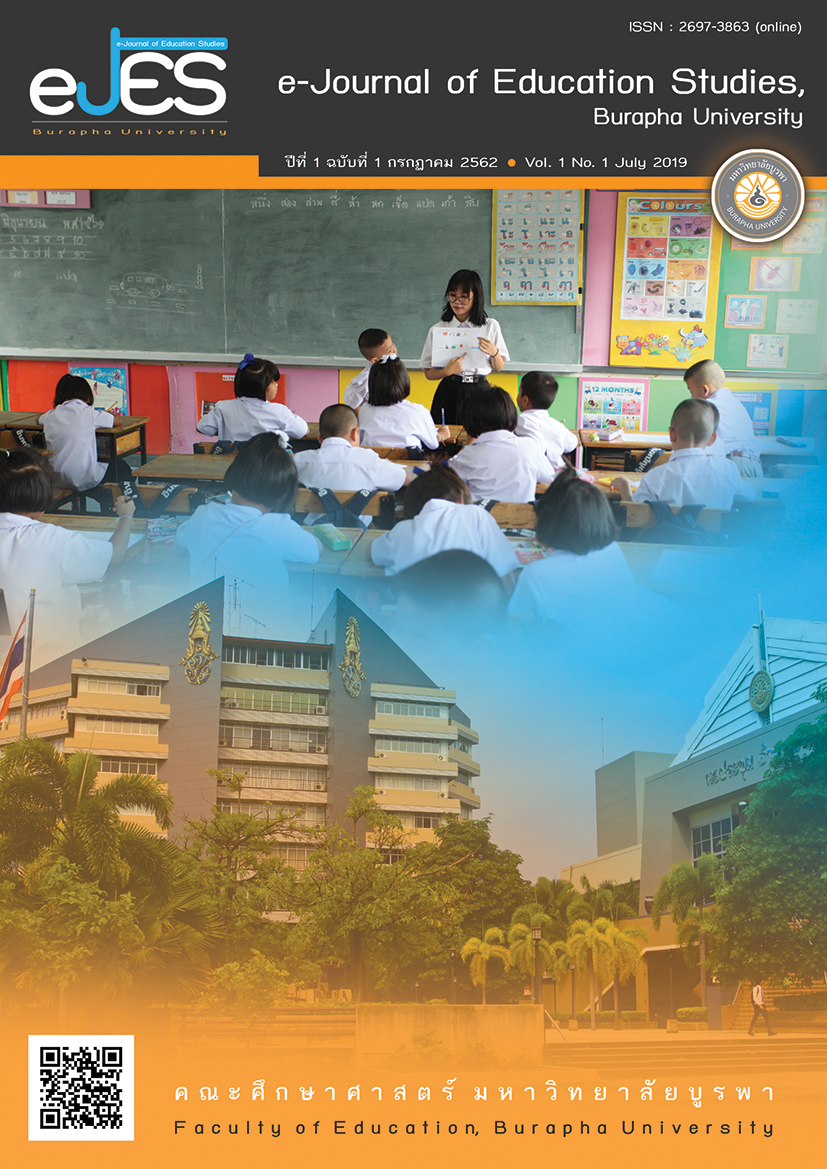Culture Shock Experiences of Foreign Teachers Working in A Selected Private School in Chonburi province, Thailand
Main Article Content
บทคัดย่อ
The overarching purposes of this study were to explore the core essence of culture shock experienced by foreign teachers who work in a selected private school in Thailand. Also, the researcher found out the meanings by the perception of the culture shock of foreign teachers. A selected private school was allowed to collect data in Chonburi province, Thailand. Then, there are selected 14 participants from the school with at least 1 year of work experience. A phenomenological research methodology was employed in this qualitative research. Data were considered from 14 foreign teachers through in-depth interviews. The Modification of the Stevick-Colaizzi-Keen Method of Analysis of Phenomenological Data was utilized for analysis of the data collected analyze to identify meaning units and themes. The findings suggested that the core essence of culture shock was experienced by foreign teachers who work in a private school in Chonburi province, Thailand. It has been determined that include six themes: 1) hierarchy culture at school; 2) behaviors of people at school; 3) jealous caused gossip at the workplace; 4) school management differences; 5) language barriers; 6) school environment differences. The influences of cultural shocks have been determined that include three themes: 1) cultural shocks affect self-emotions; 2) culture shock affects attitudes; 3) overcome culture shock techniques. Also, the meanings by the perception of the culture shock of foreign teachers have been determined that include two parts: 1) a learning experiences; 2) an adaptation process.
Article Details
อ้างอิงแหล่งที่มา
เอกสารอ้างอิง
Chris, S. (2001). Living and Working in Bangkok. Retrieved April 11, 2019, from https://www.stickmanbangkok.com/living-and-working-in-bangkok/employment-visas-and-work-permits/
Creswell, J. W. (1998). Qualitative inquiry and research design Choosing among five traditions. Thousand Oaks, CA: Sage.
Creswell, J. W. (2014). Research Design Qualitative, Quantitative and Mixed Methods Approaches (4th ed.). Thousand Oaks, CA: Sage.
Eric, J. G. and Robert, R. V. (2017). The Thai Education System is Failing its Students. Retrieved February, 17, 2019, from https://www.chiangraitimes.com/the-thai-education-system-is-failing-its-students.html
Esl, S. (2017). How to Deal with Culture Shock When Teaching English Abroad. Retrieved May 3, 2019, from https://www.eslstarter.com/community/articles/2017-12-07-how-to-deal-with-culture-shock-when-teaching-english-abroad
Frith, B. (2018). What makes staff lazy? Retrieved May 3, 2018, from https://hrmagazine.co.uk/article-details/what-makes-staff-lazy
Gibson, R. (2000). Intercultural Business Communication. Berlin: Fachsprache English. p. 24.
Graduateland. (2016). Dealing with workplace culture shock in your first job. Retrieved May 2, 2019, from https://graduateland.com/article/workplace-culture-shock
Guba, E. G., & Lincoln, Y. S. (1994). Competing paradigms in qualitative research. In N. K. Denzin & Y. S. Lincoln (Eds.), Handbook of qualitative research (pp. 105-117). Thousand Oaks, CA, US: Sage Publications, Inc.
Guirdham, M. (1999). Communicating across cultures. London. Retrieved February, 18, 2018, from https://www.grin.com/document/108360
Jarn, A. (2019). Why is it so difficult to get a straight answer to a visa-related question? Retrieved May 3, 2019, from https://www.ajarn.com/help-and-guides/work-permit-visa-faq/why-is-it-so-difficult-to-get-a-straight-answer-to-a-visa-related-question
Jindal-Snape, D., Topping, K., Todman, J. &Zhou, Y. F. (2008). Theoretical models of culture shock and adaptation in international students in higher education. Retrieved March, 18, 2019, from https://www.tandfonline.com/doi/pdf/10.1080/
03075070701794833
John, M. (2017). To boost failing Thai education, give foreign teachers proper contracts. Retrieved May 2, 2019, from https://www.nationmultimedia.com/detail/
your_say/30333993
Johnson, R. B., & Christensen, L. B. (2004). Educational Research Quantitative, Qualitative, and Mixed Approaches. Boston, MA: Allyn and Bacon. Retrieved May 2, 2018, from https://dx.doi.org/10.3102/0013189X033007014
Ken, O. (2017). Stop Ignoring Problems at Work. Retrieved May 6, 2019, from https://www.kenokel.com/stop-ignoring-problems-work/
Liam, C. (2014). Combating Culture Shock: Tips from a Survivor. Retrieved May 5, 2019, from https://blog.gaijinpot.com/combating-culture-shock/
Matthew, M. (2016). Seven tips to take the shock out of culture shock. Retrieved May 3, 2019, from https://www.communicaid.com/cross-cultural-training/blog/top-tips-overcoming-culture-shock/
Moustakas, C. (1994). Phenomenological research methods. Thousand Oaks, CA: Sage.
Nicole, L. G. (2016). Teaching in Thailand: Mixed Level Classrooms and Classroom Behavior. Retrieved April 10, 2019, from https://www.nicolelgeller.com/teaching/teaching-in-thailand-mixed-level-classrooms-and-classroom-behavior/
Oberg, K. (1960). Cultural shock: Adjustment to new cultural environments. Practical Anthropology 7: 177–82.
Polkinghorne, D. E. (2005). Language and meaning: Data collection in qualitative research. Journal of Counseling Psychology, 52(2), 137-145. Retrieved February, 19, 2018, from https://dx.doi.org/10.1037/0022-0167.52.2.137
Rubin, H.J. and Rubin, I.S. (2011) Qualitative Interviewing: The Art of Hearing Data. 2nd Edition, Sage Publications, London.
Safary, W. (2012). Coping with Culture Shock in Second Language Settings: A Phenomenological Study in the Philippines. Retrieved May 2, 2019, from https://www.academia.edu/10877391/Coping_with_Culture_Shock_in_Second_Language_Settings_A_Phenomenological_Study_in_the_Philippines
Sarah, I. (2017). Bridge the language barrier with language translation technology. May 3, 2019, from https://www.useoftechnology.com/bridge-the-language-barrier-with-language-translation-technology/
Segal, T. (2018). Culture shock. Investopedia. Retrieved February, 18, 2019, from https://www.investopedia.com/terms/c/culture-shock.asp
Sims. H.R., & Schraeder, M. (2004). An Examination of Salient Factors Affecting Expatriate Culture Shock. May 3, 2019, from https://www.researchgate.net/publication/
305349114_Culture_Shock_and_Its_effects_on_Expatriates
Smalley, W.A. (1963). Culture shock, language shock and the shock of self-discovery. Practical Anthropology 10: pp. 49-56.
Sonsri, G. (2006). The Collaborative Approach in Service Delivery of Public Health and Environment Division: A Proposal for Ubon Ratchatani Metropolitan Municipality, Thailand. Journal of Social Development, 8(2), p.7. May 3, 2019, from https://www.tci-thaijo.org/index.php/jsd/article/view/31161
Sriussadaporn, C., & Jablin, M. (1999). An exploratory study of communication competence in Thai organizations. The Journal of Business Communication, 36(4), 382-438.
Valle, R., King, M., & Halling, S. (1989). An introduction to existential- phenomenological thought in psychology. In R. Valle, & S. Halling (Eds.). Existential phenomenological perspective in psychology (pp. 3-16). New York: Plenum Press.
Wagner, W. (1996). Kulturschock Deutschland. Hamburg. Retrieved February, 18, 2018, from https://www.grin.com/document/108360
Ward, C., Bochner, S. & Furnham, A. (2001). The Psychology of Culture Shock. Sussex & Philadelphia: Routledge.


